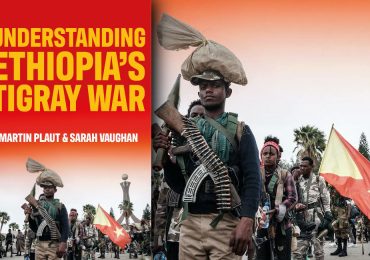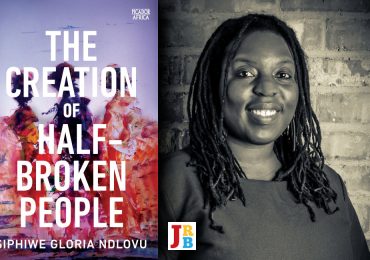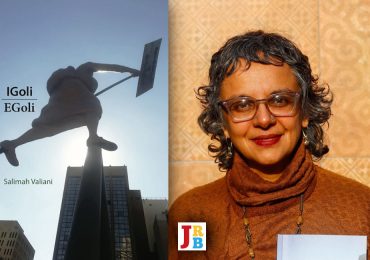The author visited Harare, Zimbabwe shortly after the military intervention that led to President Robert Mugabe’s resignation on 21 November, 2017, and filed this dispatch with The JRB. In Africa, as in many other parts of the world, reportage can be as vivid as fiction, if not more so, and so we’re including this piece as an honorary adjunct to our December Fiction Issue.
The Visiting Hours
Sekuru dies on a hospital bed just before the afternoon visiting hours on a Sunday. Resuscitation is attempted for over forty minutes. This is highly unusual, it doesn’t take that long to know he cannot be brought back from a death as certain as his. Was it because his family had gathered downstairs? It is known that in some hospitals in Harare, they only do the rounds just before the visiting hours, lest the families see exactly how negligible the care is. Well, on this day his family were waiting—their presence a reminder of the existence he had been enjoying only forty-eight hours before? ‘Enjoying’ is perhaps not the best word to use in this instance. Life in Zimbabwe maybe endured, tackled, resisted—choose any number of other fighting words—before it can be enjoyed. Enjoyment is for the precious few.
Sekuru’s death is two months before Zimbabwe makes the news around the world for a military coup which was not quite a coup. Waking on that morning, as on the afternoon of Sekuru’s death, I recall a stunningly complex reaction. Part confusion: where do I stand now? In the very moment of finding out. Eyes fixated on the screen, on an army officer declaring that this is not a coup, or, in Sekuru’s case, the shocked cracking voice of a parent who had tried in vain to join a resuscitation effort that was all too futile. In both there lies the fate of the migrant, the diasporian, whose world has shifted but whose immediate surroundings are cold with indifference.
I have experienced other deaths. I was not immediately notified of my father’s. It still remains unclear why. I suppose in the immediate aftermath of it, it belonged to the people with him to be in shock and mourning. It was they after all who had carried him on horseback to the hospital after he had a fit, which caused him to fall into a fire, before he slowly died in a hospital in Rusape, one or two people nearby. They who had sold a cow and pulled money together before a doctor could be roused to tend to him. It belonged to them to feel that someone of great meaning to them had left this world. I know that when it came to burying him it occurred that money ought to be sent from England and thus the phone call was made and as much was imparted. So mundane in communication was this phone call, so little was said that signaled this momentous and significant turn in my life, that looking back on it I cannot blame myself for continuing on to my social engagement and blurting out on a dancefloor—with florid lighting and men in tank tops and glittered faces—that my father was dead. Yet I had no more information than those simple words; that, and that money had to be sent to him. The rest of the details came later. Such is the case of the migrant. When I was asked for further detail, there was from me a stupefied silence.
Other deaths, too, bring a sting in remembering them. News of my stepfather’s death was more immediate: it came on the very same day he died. The confusion was the same, though. I had to remind myself that something has changed in my life, although my life remains the same where I am. These phone calls are brief for there is mourning to be done. People are gathering. There is a performance of grief to be performed. In the dirty dreary London air, I gather myself and try to carry on with the tasks at hand.
Sekuru leaves behind three wives, sixteen children and countless nephews, nieces and grandchildren. In the ‘good old days’ of my childhood in the eighties, when Zimbabwe was in its robust infancy, we had journeyed to his rural compound with a pleasing frequency. He knew us all by a look in the eye that conveyed, in some instances, more protective, supportive contact than some of us had with our own fathers. This was a time when the shops were full and the tradition of ‘going kumusha’ at the weekend or during school holidays was as time-honoured among the black community as the nativity. Our parents, whatever work they were engaged in, had something to show for it at the end of the month. They sent us to Sekuru with bags full of shopping and lined pockets for granny. When we returned to school, it was in shoes shinning with hope and parental pride.
In London there is a resolve that this death will be experienced differently. I make plans to mourn him in person. I decide to go. To come home. He is buried on the Tuesday morning. It takes me until the week of the coup to come and pay my respects.
The day of this coup-that-is-not-a-coup I wake up in daze. What I see on my screen and in the papers causes the same sensation as one of those phone calls announcing a death. I am not there! It has taken me two months to finally come for Sekuru. This is diasporian time. Separate to all other rhythms of life. I watch the news with silent trepidation. What will happen? This goes on for how long? The Western world’s response seems eager for blood. Even mockery. The descriptions of Zimbabwe are breathtakingly alien to me. I make a phone call to my mother, on the morning of the coup, she is in the garden trimming her flowers:
‘How do you feel?’ I gravely enquire.
‘About what?’
‘The coup …’
‘The what?’
‘The coup mum, there has been a coup in Zimbabwe.’
‘Really? I thought I heard some gunshots last night.’
Not many people watch the state television.
‘Are you still coming?’ she says tentatively.
I was ashamed to say I wasn’t sure. As if my life would be in danger if I were to enter Zimbabwe at such a time.
Arrival in Harare. Nothing has changed. One longs to see the visible signs of change. The ‘new Zimbabwe’ anticipated on Twitter is nowhere evident. The peaceful protesters have long folded their flags and discarded their banners, the soldiers are back in the barracks. There is a general sanguine nothingness. Each Zimbabwean carries themselves with a cool composure that makes the visitor look emotionally over-adorned. Harare is its own sort of place. It is non-intrusive, it does not call you out to give it your time; you come to it, like a sinner to confession. In those first moments of arrival, one checks oneself, over and over again. Shifting and turning upside down inside. Resisting the urge to sound as one has sounded only twenty-four hours before. Upon seeing you everyone greets you as they do others, in calm, lyrical, measured Shona. Only to be met with the fumbles of very simple Shona words from me. I chide myself. I can speak the language. But the manner and the words are not yet returned. The marriage of the two happens in the darkening hours as the too-brief days of Harare suddenly end, and sudden dusk like doom calls up the nightlife of the city. There some friends long-returned from the diaspora offer a bridge to how to be ‘back home’. Singing along to local songs. Feeling quietly that one is gaining back ground and a sense of self.
I wake the next morning with a tremendous Harare hangover and sense of depression. It is the day I travel to kumusha. Back to the rural stead where many of the hours of my childhood outside of school were spent. I will soon see where Sekuru is buried. It is a journey that has been made many times. In good days and in bad. My brother and sister and I, as children, would travel together. In those days, when I returned from England, my grandmother would kill a chicken or a cow. They do not do this now. Very few people can.
That afternoon of Sekuru’s death, at the hospital, there is a question of where to take him, where he should be mourned in Harare—but ultimately it was always going to be here, in Chihota, the seat of the family. The pain and shock of losing a loved one is met with the panic and fear of what will happen to each person who remains. The drawing of lines must begin immediately. Ownership in Zimbabwe is crucial. Who owns decides. Two months later as I return it is all playing out. Sekuru’s things may have been divided hastily as per custom. Tallying up of the visible possessions and crude division among the wives and children. Yet Sekuru himself, with an eye on order and fairness, has registered his will to be read at the High Court. Thus the family shall gather again in the next few days to hear what lies in store for them.
Sekuru’s aged mother, Mugabe’s senior by a few years, has lost her pension in losing her son. She was confident he would bury her. She has now lived longer than anyone else we can think of. If only there was a way in which we could measure her contribution to this country, and see her compensated for it. Looking at her I cannot fathom how Mugabe could function as president; she struggles with the simple act of getting up from the floor. She no longer stands straight. Her grief cuts to the bone. Seeing me, she is in shock for a few seconds. I see her heart begin to rise. The memory of his death, the occasion of my coming, all enlivened in her, she issues a pitiful sonorous cry. I look on with a stilted dumbness. I cannot find such feeling in me for dear, lost Sekuru.
Later we stand at Sekuru’s grave, an unremarkable pile of soil next to his sister’s grave. My mother is by my side and few steps behind is one of his wives, clearly disturbed. This is the first time my aunt has been at his grave since he was laid in it. Even so she must spy it every day from her kitchen, a few yards away. It is otherwise an ordinary afternoon. It is expected of me to speak to him. In his grave. To tell him that I have made the journey to see him. And to say that I hope he is well where he is, and more. My mother does this with ease. Speaking to him with such clarity of feeling. She soothes him, and reassures him that all of his business will be resolved. I am awestruck. There I stand, a mouth full of teeth, helpless. Once again, I haven’t the language to begin. I want to ask to be left to speak to him in my mangled Shona alone, but that would call undue attention to the moment. I have experienced this before, at my father’s grave. It is no use to stand there wishing the words to come. They do not. After a while, the women give up on me and we slowly snake our way back to the house.
Everywhere in Harare now I have started seeing the outcomes of the ‘coup’. The maid’s radio relays what is happening in Parliament. A minister is pictured in the newspapers and on television, accused of embezzlement. Billions of dollars he has appropriated. Yet he is only the tip of the iceberg. It’s a squandering that catches at the throat when I think of what will happen to Sekuru and his family, who are ever-expanding: one of his son’s wives has yesterday given birth to triplets. The minister, the former first lady and others are the talk of dinner and drinks parties. People speak with snide glee of what has been lost. Sekuru’s family represent perhaps the simplest of people in Zimbabwe. Simple in their way of life. Simple in their expectations of what a government must do for its people. These are people who, as happened at my arrival at Sekuru’s compound, cultivate a day after the rains and eat what they grow.
Not long after visiting Sekuru’s grave I meet with a friend at a trendy bar. A bottle of wine is eighteen US dollars, a large portion of my gardener’s weekly wage. Moet et Chandon is 200 dollars—two school terms for our maid’s sons. The bar is called Pariah. I have known this friend for a while. We first met in London before she moved to Zimbabwe and set up a life. Now she has a daughter and partner in Harare. Categorically, she states that the last two years have been the worst she has ever experienced. Owing especially to a lack of work—then most recently to a lack of cash. Her struggles continue when she considers how much the nursery fees for her small daughter will be. Other friends join us for what becomes a frenzy of tales on the excesses of corruption. Everyone seems to be complicit. There is a sense in which this will carry on, hidden but just as insidious. The balmy evening air washes over me as we leave the bar, not quite sure what to think or what to say. There is dirt in the mouth that cannot be washed away.
They say that the diaspora is clamouring to return. My family tells me to get my Zimbabwean passport. I had lost it thus: in 1996, my mother suggested to my father that we come to visit her in England. It was only fair to spend a holiday with her, and my father agreed, as it was only for a few weeks. I left my missionary boarding school just outside Harare. Packed my trunk with all my belongings—the kind you have at thirteen. I said my goodbyes to friends and family and set off already excited by what I would return with. That cold December 16th arrival in England was of course more permanent than cement. Mother was not about to let us return to Zimbabwe. I had a child passport; by the time it expired I was entitled to an English passport. I readily took it up so I could travel in Europe and America. I tried to go the Zimbabwean embassy in London to get a new Zimbabwean passport. It was not possible. I was told I had to return to Zimbabwe and be issued with a national identity card, which every Zimbabwean eighteen years and older should have, but of course I had missed that seminal rite of passage. This return would have to be for at least three months. Again, it was not possible. I remained without a Zimbabwean identity, as it were. So, I have an option now to start the proceedings again. It throws me to think of it. Why do I need this passport? What is its value? Is it this hope in the air that makes me more eager to have it? Perhaps a new part of my identity is emerging with this so-called new dawn?
We wake up early to go to the High Court to hear Sekuru’s will read. At the reading it suddenly catches me that he is really gone. A grief lodged inside of me breaks free. It happens out of nowhere. I think it was in hearing his words—from the grave, as the saying goes. In these few words he has left there is still life. His voice is audible. Soft and clear. Sure of what he is saying. It is all entirely decent. It calms everyone who has gathered. Sekuru proves that he has not forgotten his wives, his children, his mother. He may be gone but his guiding hand rests on all our shoulders. As for me, it was this legal ritual, of reading the will, which became the healing ceremony I had longed for.
When Sekuru first fell ill, they took him to a clinic. There they realised he was much worse than his stoic forbearance allowed for. To get him to the hospital an ambulance had to be called, it had to be paid for on the spot. At arrival, everything came at a price, also to be paid there and then: the needle, the syringe as well as the drip. As word went round of how grave his condition was, small folded dirty single dollar bills exchanged hands, newly issued Zimbabwean reserve bond notes were lent and borrowed as his family gathered to see him.
It was no small feat that they all gathered there, on that Sunday, at the hospital, while I was having lunch at the Royal Oak Pub in Harlesden, London. His family were gathered there ready to see him in the early-evening visiting hours. Upstairs they were trying to resuscitate him, in vain.
- Tonderai Munyevu is a writer and actor, born in Zimbabwe and raised in London. His plays include Harare Files (How 700,000 People Lost Their Homes), co- written with Sarah Norman, and Zhe [Noun: Undefined], an autobiographical play co-created by Chuck Mike and Antonia Kemi Coker. His short stories include ‘Nightlife’, ‘Bullets’ (included in Black and Gay in The UK, published Team Angelica in 2014) and the BBC Radio short ‘The Tranquil Mind’. He is a founding member and co-artistic director of the international Shakespearean troupe Two Gents Productions. Follow him on Twitter.





